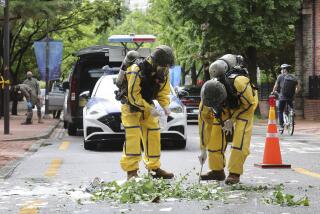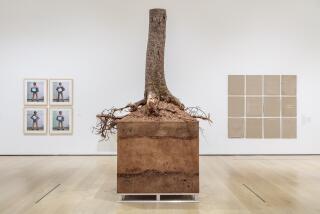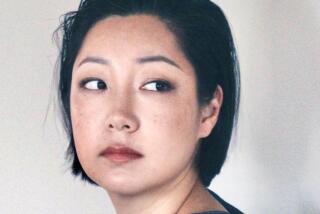1980 Uprising : Memories of Kwangju Haunt Korea
KWANGJU, South Korea â Near the end of a hard dirt road, in a depression among the rice paddies, lies Kwangju City Cemetery.
A sign, written in Korean and English, identifies a knoll covered with simple black headstones. âThis is Graveyard III,â the sign says. âThis place has become an eternal sacred land where 101 of thousands of democratic patriots lie buried. They were bitterly slain with the military dictatorâs firearms.â
Chun Kye Ryang, a retired navy man, walked slowly past the grass-covered mounds and stopped at a headstone inscribed with the name Chun Young Jin.
âThis is my son,â he said. âHe was a high school student, 18 years old. He was riding on a truck with other civilian militia on May 21 (1980) when he was shot by an army sniper.
Campaign Issue
âHere,â he said, pointing to his head. âOne round.â
Chunâs son died in a bloody, 10-day conflict between rulers and ruled that remains the most emotional event in this country since the Korean War. For many Koreans, mere mention of the name Kwangju resonates like the Alamo or Kent State. And this year, it has become a pivotal issue in the campaign for Decemberâs presidential election.
Politicians of all stripes come to Kwangju and try to bend its history to their own purposes.
âTo the fallen souls of Kwangju,â intoned Kim Dae Jung, a presidential candidate and the cityâs favorite son, on his visit here in September. âThanks to their contribution, there is now hope for democracy.â
Another candidate, Roh Tae Woo, whom people here regard as bearing partial responsibility for Kwangju, came to the city last month and declared: âI think it my duty to solve the questions arising from the Kwangju incident. So I came here, thinking myself owing something to you.â
Unfolded Amid Turmoil
What happened here 7 1/2 years ago unfolded amid the turmoil that followed the October, 1979, assassination of President Park Chung Hee. Here and elsewhere across the country, students were demonstrating for change, and rival politicians were preparing for the prospect of a presidential election.
On May 17, 1980, the government, in effect run by then-Gen. Chun Doo Hwan and other members of the National Security Council, declared martial law and arrested Kim Dae Jung, a longtime rival to Park who is anathema to the military. The next morning, paratroopers were sent into Kwangju to put down the resulting demonstrations. A blood bath followed, with soldiers bayonetting and beating rock-throwing students, other protesters, even onlookers.
The clashes continued, and on May 21 the paratroopers began shooting demonstrators. That afternoon, the students broke into police stations and armories and armed themselves. Within a few days, the demonstrators, calling themselves the civilian militia, had taken control of the city. Kwangju was in the hands of insurgents.
Government forces retook the city on May 27 with overwhelming force, killing a determined core of demonstrators who refused to surrender.
Death Count Varies
The government, now headed by Chun as president, says that 194 civilians were killed in the uprising. In Kwangju, people say that at least 2,000 people were killed. Military losses were fewer than 20, the government says.
Since the day the fighting ended here, anti-government forces have denied the legitimacy of Chunâs presidency, which was proclaimed three months later.
Kwangju will never forget.
âNaturally, itâs become a central, emotional issue because itâs not been treated rightly,â said Chun, the former navy man whose son was killed and who now heads the May 18 Bereaved Families Assn. âAll I want is that honor be restored to my son and the others. They should be labeled patriots rather than rebels. . . . I hope the day will come soon. Iâm tired of fighting.â
Struggle is not a recent thing in Kwangju. Long before 1980, the southwestern provincial capital, focal point of the two Cholla provinces, had found itself at odds with other powers in Korea. The bitter rivalry between the Cholla provinces and the two Kyongsang provinces in southeast Korea is historic. Relations between Kwangju and the national government in Seoul, to the north, have been little better.
City of 800,000
Kwangju, a David against outside Goliaths, does not appear combative at first look. It is a pleasant city of 800,000. A drive down Kumnamro, the main boulevard, calls up the atmosphere of the American Middle West. At the top of Kumnamro stands the big, white provincial headquarters, placid now but the last redoubt of the insurgents in 1980.
A gray-haired, 74-year-old lawyer named Hong Nam Soon has lived here since the late 1930s and has a long view of the Kwangju issue.
âUnder the Japanese, 50 years ago,â he recalled in a chat at his modest offices, âthis was a city of 40,000. We were agricultural, rice and barley, but many were rich men.
âIt was the people of Kwangju who influenced the banking situation in Seoul. We had five farmers who harvested more than 20,000 bags of rice a year. In Kyongsangdo (the rival eastern region), there were just two.â
Such comparisons are made repeatedly and casually by the people of the Cholla region--in recent years usually with bitterness.
âRegionalism in Korea dates back to early history,â Hong explained, taking a listener through the time of the Three Kingdoms (57 BC to AD 668), when the Paekche throne was centered in Cholla, and on through more recent centuries, when the east and the north became dominant.
âBut it was a friendly competition,â he said. âIt was never abnormal, not until Park Chung Hee came to powerâ in 1961.
Modern Development
Park, a native of the Kyongsang city of Taegu, began the modern development of South Korea, and he launched it in the east. The first superhighway was built from Seoul, through Taegu, to Pusan, the southern port. Industry followed.
âIn the economy, military, civil service, all the top jobs were given to people from the east,â Hong insisted. âFrom top to bottom, 80% of the places of influence are now held by easterners. And Chun Doo Hwan (also from Taegu) has continued these policies.â
Ever since the 500 years of the Yi Dynasty (1392-1910), he said, the Cholla provinces have been suppressed by superior political, military and economic power in the east and the north.
âWe got nothing,â the old man said, âso we found satisfaction in culture. The majority of the nationâs best poets, musicians and calligraphers come from Cholla. We are smarter. Even they (the easterners) admit it.
âEven today, people here eat and dress better than in the east. During the Korean War, many people from Cholla had to flee to Pusan. The easterners were poor people then, and they couldnât cook. We couldnât stand their food. We taught them how to cook.â
Now, he said, the cuisine in the southeast is bearable. All this, he insisted, has given the easterners a complex about the Cholla provinces.
âEnvy,â said Whang Mi Jin, a 22-year-old Kwangju student. âWe know regionalism isnât healthy, but there has got to be better balance. And I think that, given the opportunity, weâll do better than the other provinces.â
The people in the industrially developed eastern provinces, however, do not see it that way. They portray their western neighbors as sanctimonious bumpkins.
The regional rivalry has long since spilled over into politics, to a point where issues are lost in animosity. Two of the three major candidates for the presidency are easterners--Roh, the ruling party nominee, and Kim Young Sam, president of the major opposition party. Kim Dae Jung, the opposition leader from Kwangju, will have difficulty winning votes in Kyongsang, whatever the merits of his candidacy, but he will carry the Cholla provinces.
Beyond an honorable resolution of the Kwangju uprising, the people of Cholla want a fair shake on development.
View Toward Japan
âNo question about it, theyâve been taken advantage of,â a foreign resident said. âBut one thing people here tend to overlook is that development of the east during the Park years was designed for the trade with Japan (which faces the eastern provinces). The Japanese had put investments in there.â
Looking to the future, he pointed out a similar advantage for the Cholla provinces. They face China. South Korea and China do not have diplomatic relations, but third-country trade between the two Asian neighbors has already begun.
The government is already enlarging Kwangjuâs port of Mokpo, and Roh said on his visit here that the unused Mokpo airport will be similarly redeveloped. Korean politicians hope for normal relations--and trade--with China in the early 1990s.
Yoo Hak Sang, Kwangju director for the quasi-governmental Korea Institute for Economics and Industry, said his staff has prepared a 600-page report outlining development priorities for the area. Deficiencies in transport and communications have already been largely overcome, he said, and local technical high schools turn out more than enough skilled workers.
âSeventy percent of them now have to go east or up to Seoul to find jobs,â he said.
A joint venture of the Daewoo conglomerate and Carrier, the American air-conditioning company, has just entered production, and Pohang Iron & Steel Co., a Korean industrial giant, is building a state-of-the-art mill nearby.
All these promises and possibilities may bring Kwangju and the Cholla provinces back into the South Korean mainstream in the years ahead, but not until the scars of 1980 have begun to heal. That will take more than time.
Some Concessions
Lawyer Hong credits the government with making some concessions after the Kwangju incident. More than 3,500 people were arrested during the uprising, he said, and 300 or more were put on trial. Five were sentenced to death and six to life imprisonment.
âAll were freed within three years,â the lawyer said. âThatâs unprecedented in trial history.â
But it does not erase what the people here see as the original injustice. Hong, who headed a civilian group that tried to arrange a truce between the soldiers and demonstrators, complained: âI should have been given a big award. Instead I was imprisoned (for 19 months).â
Both Hong and Chun, of the Bereaved Families Assn., whose members received indemnities of $12,500 for each victim, insist that the stain can only begin to be expunged by honor for the dead and democracy for the country.
Chun and his backers want a monument erected to the slain insurgents somewhere in Kwangju. One suggestion is to demolish the provincial capitol and build a park on the grounds.
Lawyer Hong says a fair presidential election in December would be a beginning toward reconciliation.
âI have not voted since the (authoritarian Park Chung Heeâs) Yushin constitution was put in (in 1972),â he said quietly. âThis December, if the electionâs clean, Iâm going to vote.â
More to Read
Sign up for Essential California
The most important California stories and recommendations in your inbox every morning.
You may occasionally receive promotional content from the Los Angeles Times.










